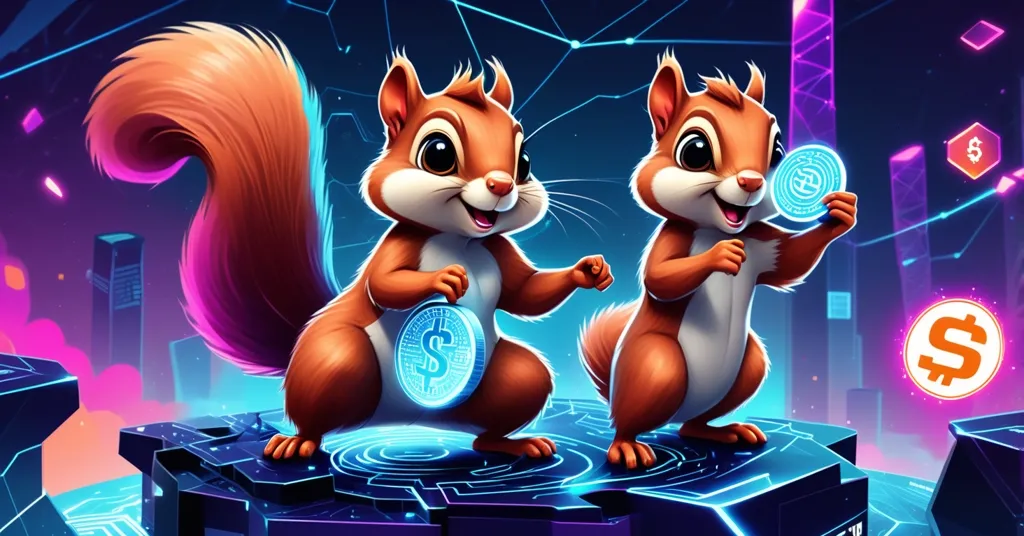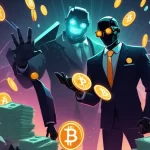Elon Musk’s Justice Rant Sparks Solana PNUT Token Surge and Political Party Buzz

Elon Musk’s Justice System Rant Ignites Solana’s PNUT Token Frenzy
Elon Musk, the billionaire wildcard and master of X’s digital megaphone, has once again sent shockwaves through the crypto market with a scorching critique of the U.S. justice system. His latest post, referencing a squirrel named Peanut, unintentionally turbocharged the Solana-based meme coin Peanut the Squirrel (PNUT), which skyrocketed over 10% in hours. Meanwhile, his talk of a new political party stirs up a different kind of disruption, leaving us to unpack the chaos of markets and motives.
- PNUT’s Meteoric Rise: Solana’s Peanut the Squirrel token surged over 10% to $0.2357, with trading volume spiking 80% to $214 million and market cap hitting $223 million.
- Musk’s Viral Jab: A Tuesday X post blasting government inaction on the Epstein client list while mentioning Peanut the Squirrel garnered 13.7 million views.
- Political Wildcard: Musk’s vision for a centrist “American Party” aims to shatter the U.S. political duopoly, though doubts loom large over its odds.
PNUT’s Nutty Rally on Solana
On a seemingly mundane Tuesday, Elon Musk dropped a bombshell on X that reverberated far beyond politics. With 13.7 million views—45% racked up in mere hours—his post criticizing the justice system tore into the U.S. government for what he sees as a perverse sense of justice.
“They arrested (and killed) Peanut but have not even tried to file charges against anyone on the Epstein client list. Government is deeply broken.”
While Musk’s mention of “Peanut” tied to a real-world squirrel controversy, the crypto crowd saw an opportunity. Traders swiftly linked his words to Peanut the Squirrel (PNUT), a meme coin on the Solana blockchain, sparking a 10% price surge to $0.2357 within 24 hours, with some data showing a fleeting peak at $0.24 the next day. Trading volume exploded by 80% to $214 million, ballooning the token’s market cap to $223 million. For those new to the game, meme coins are digital assets often spawned from internet gags or viral moments, lacking the bedrock utility of heavyweights like Bitcoin or Ethereum. Think of them as the crypto equivalent of a viral TikTok dance—fun while it lasts, but don’t bet your retirement on it. Solana, with its lightning-fast transactions and dirt-cheap fees compared to Ethereum’s sometimes sluggish network, has become a petri dish for such speculative tokens. PNUT’s rally is a classic case of hype trumping substance, but let’s dig deeper into whether there’s more to this nutty frenzy than meets the eye.
What’s driving this? Beyond Musk’s words, PNUT has little to no public tokenomics—details on supply, purpose, or developer transparency are murky at best. Unlike Bitcoin, with its capped 21 million coins and decentralized ethos, or Ethereum, powering smart contracts and decentralized apps (dApps), PNUT seems to exist purely for the lulz and the pump. There’s no evidence of tied initiatives like charity or NFTs, just a community riding the wave of a billionaire’s quip. This opacity raises red flags about potential rug pulls—scams where developers abandon a project after hyping it, leaving investors with worthless tokens. Past meme coin disasters, like the Squid Game token that crashed 99.99% in 2021 after a $3.3 million scam, serve as a grim reminder of the risks. Still, for now, PNUT is cracking open short-term profits for some, even if it’s the nuttiest gamble in town.
The Musk Effect: Tweets That Move Markets
Let’s be real—Musk isn’t new to this market-moving game. His social media antics have a notorious track record of igniting crypto frenzies, often called the “Elon Musk tweet effect.” Here’s a quick rundown of his greatest hits, backed by a historical look at his influence on crypto prices:
- Bitcoin (2021): A simple bio switch to “#bitcoin” drove its price from $32,000 to over $38,000, adding $111 billion to its market cap in days.
- Dogecoin (2021 & 2024): His “The Dogefather SNL May 8” post pushed Dogecoin up over 20% in 24 hours, with an earlier Reddit-fueled surge hitting 800% in January 2021. A 2024 AI image post added another 8% bump.
- Kekius Maximus (2024): Changing his handle and profile picture to “Kekius Maximus” in late December 2024 triggered a 500%+ surge in the obscure meme token, with early buyers seeing 5-6x gains.
- Floki (2023): A photo of his dog Floki spurred a 418% rally in the Ethereum-based Floki token, with related micro-caps spiking up to 958%.
Why does this keep happening? Behavioral economists point to a toxic cocktail of celebrity clout, herd mentality, and social media echo chambers, as explored in studies on the impact of celebrity tweets on crypto markets. Platforms like Reddit’s r/CryptoMoonShots amplify Musk’s posts into battle cries for retail investors. FOMO—Fear of Missing Out—kicks in hard, pushing impulsive buys as prices spike, often creating bubbles. Younger traders, drawn by the allure of quick gains, pile in without a second thought. Unlike Bitcoin’s $1.3 trillion market cap, grounded in scarcity and decentralization, or Ethereum’s $250 billion fueled by innovation, PNUT’s $223 million feels like chump change—a fleeting blip susceptible to brutal crashes once the buzz fades. Musk doesn’t even need to endorse these tokens directly; his playful nods to internet culture are enough to light the fuse. It’s a stark reminder that in crypto’s wild west, sentiment often outweighs fundamentals.
Meme Coins: Hype or Hazard?
Let’s not sugarcoat it—meme coins like PNUT are a double-edged sword. On one hand, they’re a quirky gateway for newcomers to dip their toes into crypto. A viral token can draw attention to blockchain tech, even if it’s just a sideshow to Bitcoin’s mission of financial sovereignty. PNUT’s surge might inspire a curious normie to explore Solana’s ecosystem or stumble upon Bitcoin’s deeper value as sound money. But the darker side is impossible to ignore. These tokens often lack utility, making them prime targets for pump-and-dump schemes or outright scams. When the hype dies, so does the price—leaving latecomers holding the bag. The 2021 Squid Game token fiasco saw investors lose millions in hours, and countless smaller meme coins have followed suit with devastating rug pulls. PNUT’s lack of transparency only heightens the gamble, as discussed in a detailed analysis of Solana meme coins like PNUT.
From a Bitcoin maximalist lens, this circus can feel like a distraction. Bitcoin’s hash rate remains rock-solid, its dominance hovers around 50% of the total crypto market, and its vision as a decentralized hedge against fiat inflation stands unshaken by meme coin mania. Yet, there’s a case to be made that tokens like PNUT fill a niche—pure, unadulterated speculation—that Bitcoin shouldn’t and doesn’t serve. They’re the carnival barkers at the entrance to crypto’s big tent, even if they often fleece the crowd. The real danger is to crypto’s credibility. Every meme coin crash fuels narratives of scams and bubbles, giving regulators more ammo to clamp down on the entire space. Could PNUT’s fleeting fame draw SEC scrutiny to Solana-based tokens, much like Dogecoin’s past surges raised eyebrows? It’s a risk worth watching, especially as lawmakers circle.
American Party: A Decentralized Political Dream?
Switching gears, Musk is cooking up a different kind of disruption with his political ambitions. He’s pitched an “American Party”—sometimes dubbed the “America Party” in discussions—as a tech-driven, fiscally responsible, energy-friendly, and centrist alternative to the U.S.’s Republican and Democratic stranglehold. Much like Bitcoin challenges financial gatekeepers, Musk’s vision seeks to upend a broken political system, tapping into widespread frustration with the two-party duopoly. His public spats with figures across the aisle, including a high-profile rift with President Trump, cement his outsider cred. With billions at his disposal, some, like former Republican congressman David Jolly, believe Musk has the muscle to fund a new political force, as detailed in a report on the challenges of third-party politics.
But hold the applause—this is no slam dunk. Election law experts and political insiders highlight a gauntlet of obstacles. State-by-state ballot access laws are a bureaucratic nightmare, demanding decades of groundwork and tens of thousands of signatures under crushing deadlines. Steven Nekhaila, chair of the Libertarian National Committee, suggests a narrower focus on a few Senate and House seats in 2026 might be Musk’s best bet over a nationwide crusade. Attorney Larry Otter warns the party could be labeled a “spoiler” by Republicans, sparking legal battles over petition signatures—error rates in states like Pennsylvania can hit 30%. History doesn’t favor third parties either; the Reform Party’s implosion is a cautionary tale. Musk’s polarizing persona might attract tech-savvy rebels but repel the seasoned operatives needed to pull this off. Even his vast resources may not overcome entrenched systemic barriers.
Still, there’s a crypto angle worth pondering. A tech-driven party could, in theory, embrace blockchain principles—transparent funding via crypto donations, or even DAO-like governance models where supporters vote directly on policies through smart contracts. Decentralized Autonomous Organizations (DAOs) are already experimenting with community-driven decision-making in the blockchain space; could a political party follow suit? Yet, much like crypto’s own regulatory struggles, Musk’s political experiment faces a wall of red tape and skepticism. It’s a long shot, even for a man who’s landed rockets on barges.
Key Questions and Takeaways
- What sparked the 10% surge in Solana’s PNUT meme coin?
Elon Musk’s X post slamming the U.S. justice system and mentioning a squirrel named Peanut led traders to tie it to PNUT, driving its price to $0.2357 with an 80% trading volume spike to $214 million. - How does Elon Musk’s social media sway crypto markets?
His tweets, bio updates, and even pet photos have historically pumped prices of Bitcoin, Dogecoin, Kekius Maximus, and Floki, fueled by retail investor FOMO and viral buzz on platforms like Reddit. - Can PNUT hold its value after the initial hype?
Unlikely—meme coins often follow a sharp rise and fall without real utility or sustained adoption, marking PNUT as a high-risk bet compared to Bitcoin’s stability. - Does Musk’s ‘American Party’ have a shot at reshaping politics?
While echoing decentralization ideals akin to Bitcoin, systemic hurdles like ballot access laws and third-party failures suggest a steep uphill battle, even with his resources. - Should crypto investors dive into meme coins like PNUT?
Tread carefully—short-term gains tempt speculators, but extreme volatility and scam risks make them a dangerous play compared to Bitcoin’s long-term promise as sound money.
Musk’s knack for upheaval—whether igniting crypto manias or dreaming of political revolutions—keeps us on edge. PNUT’s wild ride on Solana exposes the fragility and fervor of speculative markets, where a billionaire’s stray thought outweighs any whitepaper. His “American Party” teases a future where tech titans could rewrite governance, if they can slog through the swamp of bureaucracy. For Bitcoin purists, meme coin shenanigans might be a noisy sideshow, but they also usher the curious toward decentralization’s deeper truths. As Musk toys with markets and systems, one nagging thought persists: can crypto’s vision of freedom endure the very hype he stokes?



